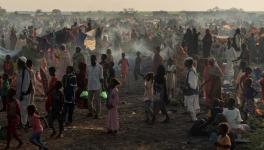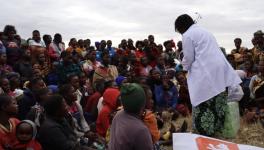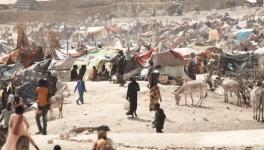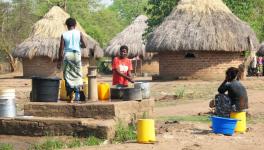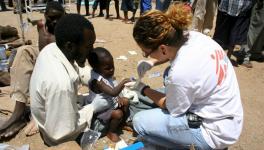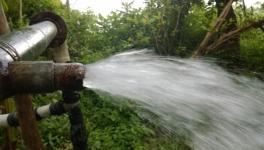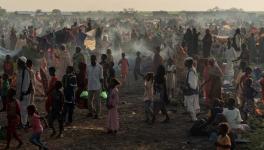Africa Sees Surge in Cholera Amid Vaccine Shortage
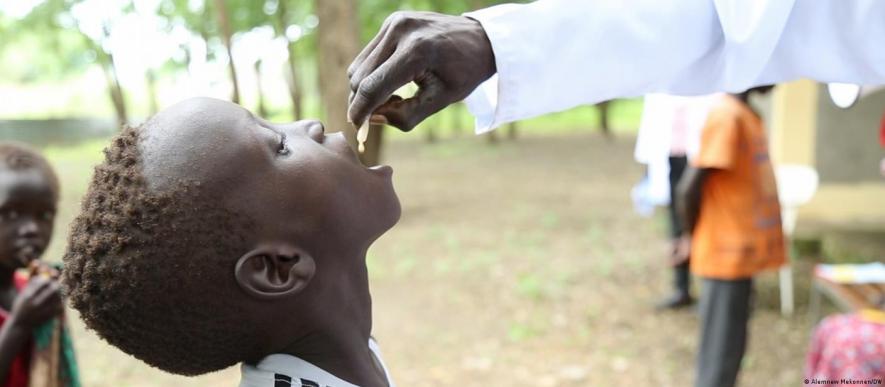
Kenya is the latest African country to report a new surge in cholera. The country's health ministry has warned of dozens of confirmed cases across six counties.
Of the 61 people infected, thirteen were in hospital, the ministry said in a statement released late last week.
Cholera is an infection of the intestine with the Vibrio cholerae bacteria. While not all those who get cholera show symptoms, around one out of five patients infected develop explosive watery diarrhea and vomiting that can lead to severe dehydration and even death, if not managed in time.
The bacteria can infect others if it is swallowed, such as when people's feces get on food or into water.
Doctors Without Borders, more usually known by its French abbreviation MSF, has also warned of suspected cholera cases in the sprawling Dadaab camp, home to more than 233,000 refugees in Kenya's east.
Many of the new arrivals are from Somalia and are fleeing the devastating drought that is battering the Horn of Africa.
Cholera is closely linked to poor sanitation, such as lack of toilets or clean water to wash hands or dishes, or cook food properly, and is often found in overcrowded settings such as camps and slums.
Acting health director general Patrick Amoth said that the prolonged drought may worsen Kenya's cholera outbreak because of the lack of access to safe water. He has put all counties on high alert.
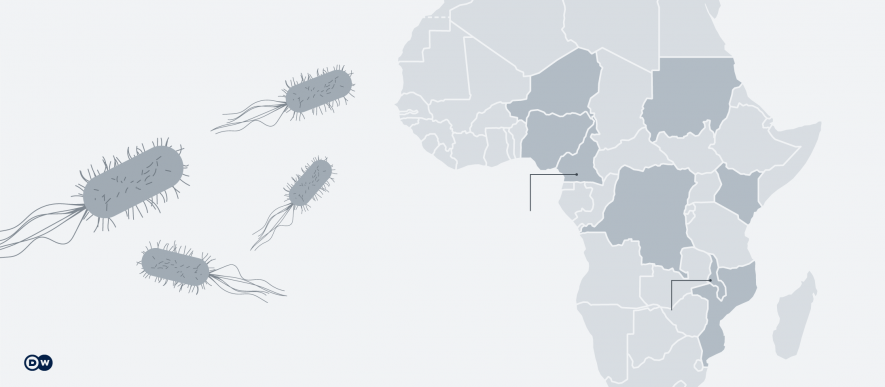
Cholera in flood-hit Nigeria
The situation is even worse on the other side of the continent where Nigeria is experiencing a spike in cholera infections following extensive flooding.
In its latest cholera situation report, Nigeria's Centre for Disease Control (NCDC) reported 4,153 suspected new cases in September with 80 deaths, nearly a fourfold increase on July figures.
In areas with a high prevalence of open defecation, heavy rainfall and flooding carry contaminated feces to water sources, such as open wells or even rivers, explains Kelly Elimian, a Nigerian epidemiologist and cholera expert.
"So when people drink water from these sources, they get a cholera infection, and you see a big explosion of cholera cases," Elimian told DW from Sweden's capital, Stockholm, where he is a research fellow at the Karolinska Institutet.
35 states in Nigeria have been affected by #floods. Anambra state has the highest number of affected people (675,953), according to @nemanigeria. Other hard-hit states include Bayelsa, Kogi, Jigawa, Adamawa, Taraba, Rivers, and Cross River. pic.twitter.com/wZvitqMnqX
— WHO Nigeria (@WHONigeria) October 21, 2022
Nigeria experiences cyclical cholera epidemics during the rainy season every few years, with the numbers normally ebbing for several years after these large outbreaks, as some people develop short-term immunity.
Because Nigeria saw its biggest cholera outbreak in a decade in 2021, natural immunity could limit the extent of this year's cases, said MSF's medical coordinator in Nigeria, Htet Aung Kyi.
While 31 out of Nigeria's 36 states reported cholera in 2022, the current cases are mainly concentrated in the north in Borno, Yobe, Gombe and Bauchi.
Recurrent cholera epidemics in Nigeria's north
Cholera proliferates in Nigeria's north, said expert Elimian, not only due to poverty, but also because the Boko Haram insurgency and other violence has led to the large-scale displacement of people who mostly lack sanitary living conditions and potable water.
MSF is running a cholera treatment unit in Borno state, which accounted for nearly two-thirds of Nigeria's new cholera cases in September. The unit in the capital Maiduguri not only allows for the standardized treatment of cholera patients, it also serves to isolate them to "prevent community spread of this highly infectious disease," MSF's Htet Aung Kyi said.
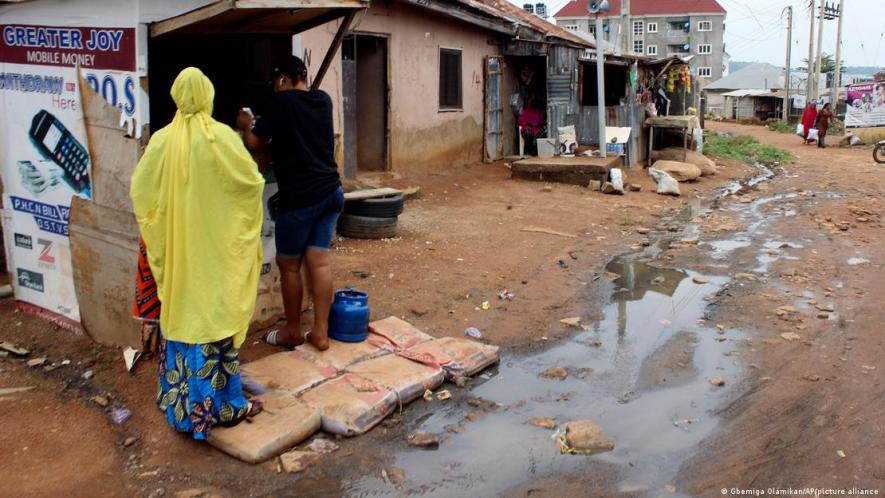
Open sewage, like that seen here in Nigeria's capital Abjua, makes it hard to defeat cholera
At the beginning of the outbreak in August, the unit saw an influx of children, but now it's treating all ages, said Augusta Chinenye Obodoefuna, the unit's nursing activity manager for MSF.
In most cases, cholera is simple to treat. People with mild to moderate infections usually recover after being given fluids and oral rehydration solution.
Severely dehydrated patients may need to be admitted to the center and be given fluids intravenously. The average stay is two to three days for adults and three to five days for children, Obodoefuna told DW.
She warned that cholera should be taken more seriously as a public health issue.
"Cholera is an instant killer if not treated within 24 hours of onset of symptoms," she told DW on the phone from Maiduguri. "Because the person is losing body fluids in the stools, in the diarrhea, and vomiting. They are losing electrolytes."
"If there isn't an urgent intervention to get this replenished, we tend to lose people immediately."
Cameroon also battles cholera
Neighboring Cameroon is also seeing a fresh wave of cholera on its flooded northern border to Nigeria and Chad. At least 17 people have died amid more than 100 cases since the outbreak was reported on Oct. 18. The health ministry has said there were probably many uncounted cases in hard-to-reach villages in the flooded region.
Linda Esso from Cameroon's Health Ministry said hospitals at the border are overwhelmed. She warned that people shouldn't blame Nigerians for bringing the cholera infections.
"We can't say that the current wave of cholera infections originates in Nigeria," she said in a televised address. "There are possibilities that some civilians infected or affected by the outbreak are moving to accessible hospitals on both sides of the border to seek help. Cholera is currently spreading through the Lake Chad basin with ease."
Cholera has also made it into the refugee camp of Minawao, in Cameroon's extreme north, which is home to some 76,000 Nigerians fleeing Boko Haram terrorism.
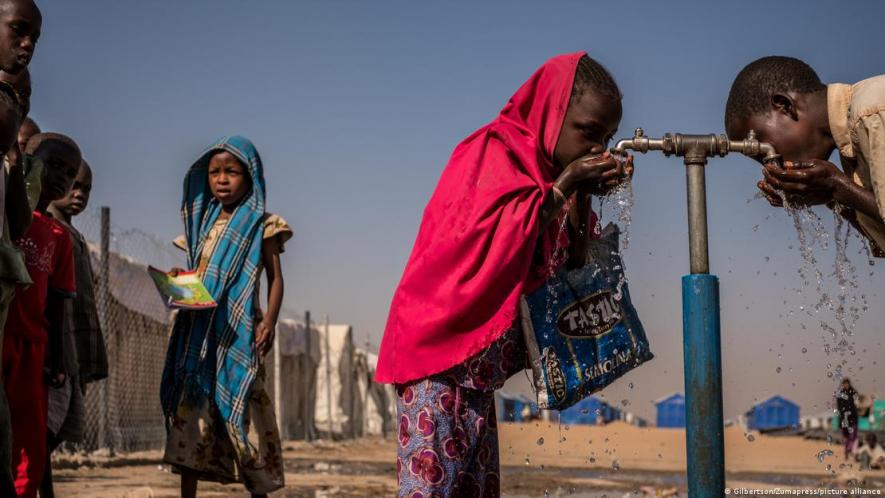
Clean potable water is essential to prevent cholera
Global vaccine shortage
The cholera surges come amid a shortage of vaccines, which are normally given as two doses. These provide protection for two to three years, depending on the type of vaccine given.
But on Oct. 19,the World Health Organization (WHO) announced the suspension of the two-dose regime because of what it said was a "strained global supply." People will be vaccinated with only a single dose, which provides short term protection, WHO said.
"The pivot in strategy will allow for the doses to be used in more countries, at a time of unprecedented rise in cholera outbreaks worldwide," the WHO said in a statement.
According to the WHO, the world is moving towards more numerous, widespread and severe cholera outbreaks due to factors such as floods, droughts and conflict that limit access to clean water.
MSF's Htet Aung Kyi said that while the two doses were obviously better because they give longer cholera immunity, "one dose was also good" when reacting to an outbreak to help cut transmission.
But, he said, those responsible should ensure this one dose ends up where the outbreaks are "so that we can vaccinate people as soon as possible."
Apart from vaccinating in hotspots, providing clean water and educating communities about sanitation and hygiene, as well as food preparation, is key to stopping cholera outbreaks.
"It's something we see every year," said MSF nurse Obodoefuna. "We know these things. We can prevent them."
Moki Edwin Kindzeka in Yaounde, Cameroon, contributed to this article.
Edited by: Cristina KrippahI
Get the latest reports & analysis with people's perspective on Protests, movements & deep analytical videos, discussions of the current affairs in your Telegram app. Subscribe to NewsClick's Telegram channel & get Real-Time updates on stories, as they get published on our website.










